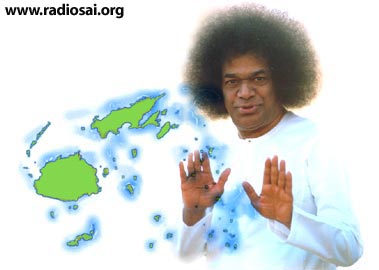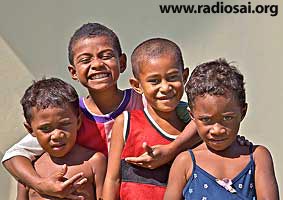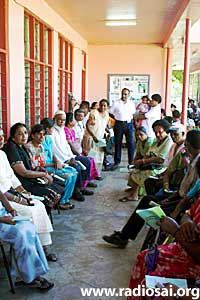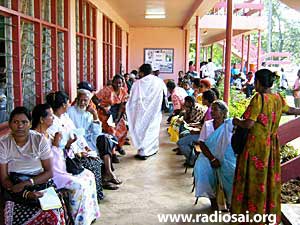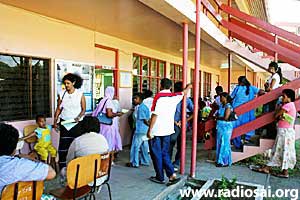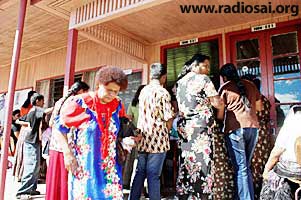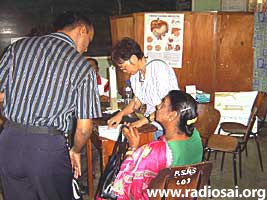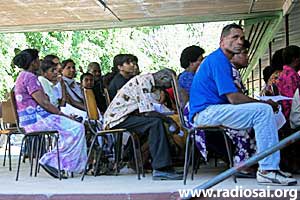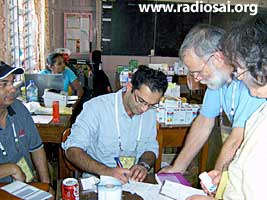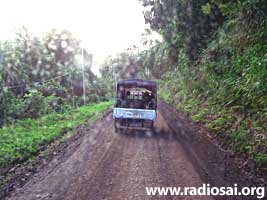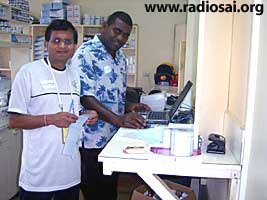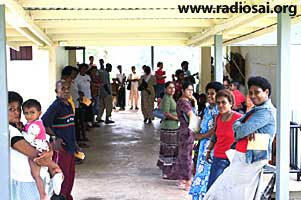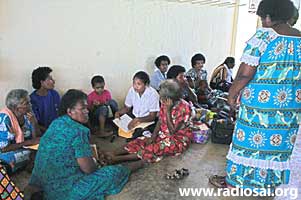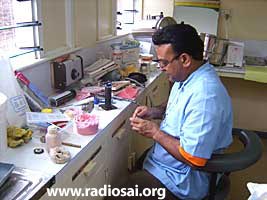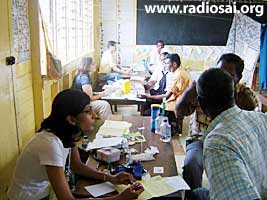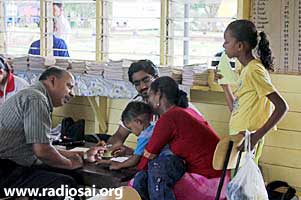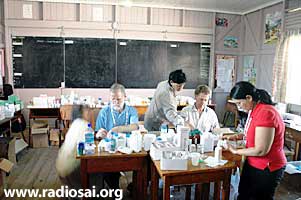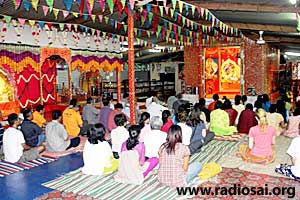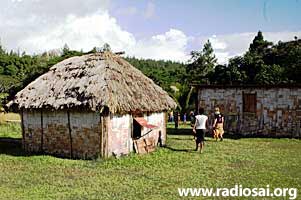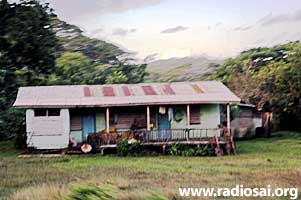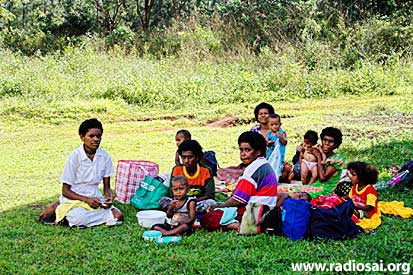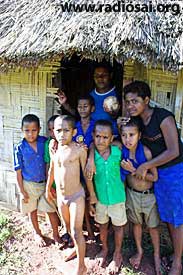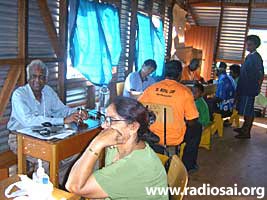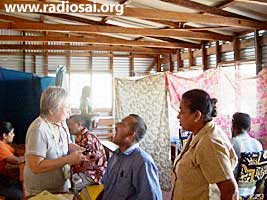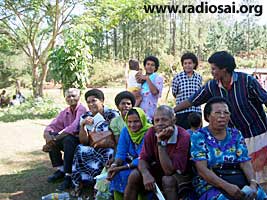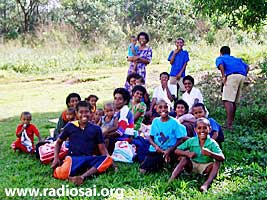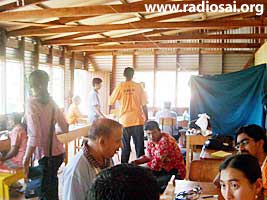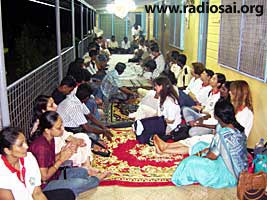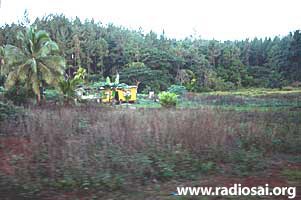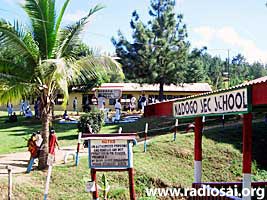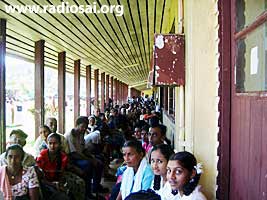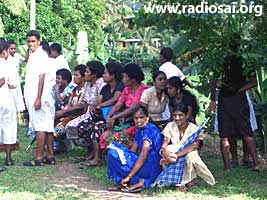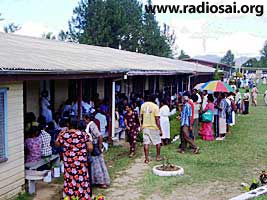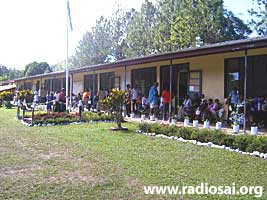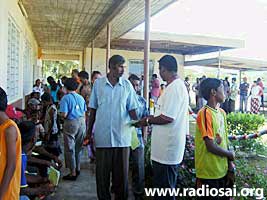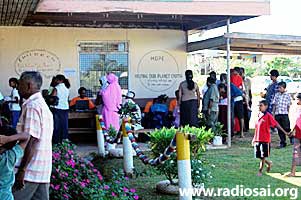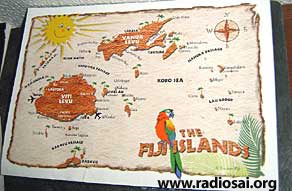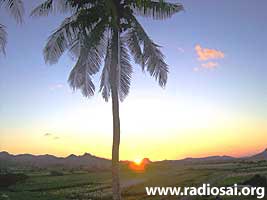 |
 |
 |
Volume
5 - Issue 10
OCTOBER 2007 |
|
Sai Medical Camps in Fiji ...Love in Action By Doug Saunders
For eight decades now, Bhagavan Baba has been inspiring His devotees in every nook and corner of the globe to follow His example of living a life of utter selflessness and compassion, and work towards bringing relief and love to those in pain and poverty. The much talked-about gram seva or rural service projects and the Mobile Medical Hospital of Prashanthi Nilayam are proving to be the epicenter whose ripple effect is spreading across the planet, to far-flung island nations, countries and continents.
Through a series of well-planned medical camps, the devotees of Baba from New Zealand, Australia, the United States of America and Fiji worked in unison to serve the most neglected and needy patients in the remotest areas throughout the island nation of Fiji, spreading love and light of Baba’s universal teachings in a coup ravaged nation. Over 50 medical professionals and many more volunteers worked round the clock to serve 5,000 patients from the 16th of June through the 23rd of June, 2007 and the fuel that kept everyone going was the loving energy of Sai that was felt palpably by those who served and those who were served. Doug Saunders reports from New Zealand on the Sai medical camp that delivered specialized medical relief to 5,000 needy Fijians across the isolated nation, while drawing medical professionals and volunteers from 4 different nations, to work in unity as Sai’s instruments of selfless love, compassion, consideration and service. The report archives the daily accomplishments of the group at a time when Fiji had been through yet another coup, the country’s diplomatic relations with the international community were at an all time low and the political environment was unstable. Yet the devotees of Bhagavan Baba forged ahead to render service propelled by selfless love and found doors opening for them everywhere.
On Friday, 15 June, fifty health professionals and volunteers from the Sathya Sai Organisations of Australia, New Zealand and the USA met up in Lautoka, Fiji and began preparations for the 7 days of medical camps coordinated by the Fiji, New Zealand and Australian devotees working together in unity and love. Fiji is made up of a group of 330 islands (of which a third are inhabited) which lie in the heart of the Pacific Ocean midway between the equator and the South Pole, with the majority of the approximately 840,000 population living on the largest island of Viti Levu and about 200,000 residing on the second largest island of Vanua Levu. The population breakdown is roughly 50% indigenous Fijian, 34% of Indian descent and the remainder is of other races. Fiji has experienced four military coups over the past 20 years which has caused many qualified people to emigrate overseas which in turn has led to the problems encountered today in the remote areas where adequate health care is not easily accessible. The locations for the camps, particularly in Vanua Levu, were chosen because of poor infrastructure, the remoteness from urban areas with difficult access to secondary level health care facilities. Most of the population on this island live on subsistence plantations under very trying conditions, and the political upheavals over the past 10 to 20 years have added to their woes creating a feeling of helplessness. The medical camps were targeted to benefit those most in need who form part of the following statistic's sad story:
Fijian Government Supports the Camps The Sai service teams in Fiji arranged all the sites where the camps were to be held and once again, thanks to the faith that everyone had in Swami’s grace and compassion, doors opened with the permission of the Fijian Government’s Minister of Education and local Headmasters, six of the seven camps were held at schools and one held at Nabuowalu Hospital, with the blessing of the local Fijian District Health Board. The Headmasters and staff helped by supplying meals and drinking water for all the team, and this showed everyone working together in unity and love, as they provided a much needed service to those in real need without any expectation of any reward. It was a living example of Swami’s Love in Action. At approximately 5.30 p.m. on 15 June, the team from New Zealand landed at Nadi Airport on the island of Viti Levu accompanied by 20 cartons of medical supplies that had been supplied free in New Zealand by various groups with no strings attached. A week or so earlier, a team member had traveled to Fiji and had purchased another 30 odd cartons of medicines from a supplier there, all paid for by wonderful Sai devotes in Australia and New Zealand who had once again, opened their hearts and their wallets as they had all seen just how beneficial the camps in 2006 had been. A volunteer non-Sai group in Auckland gave 600 used spectacles and sunglasses which they had sterilized, sorted, graded and packed. As well as this, the optometrist from Australia brought over 750 sets of brand new spectacles which he had donated himself and they were all given out. The New Zealand group was traveling light with their personal effects as they knew they would be overweight with the 20 cartons of medicines and medical supplies, but once again, God smiled on them as they checked in at Auckland International Airport as the Airline allowed them to board without any penalties. Also, a few weeks prior to their departure from New Zealand, the military in Fiji had taken over the elected Government with yet another coup! And as a result of the changed scenario, the new military junta had banished the current New Zealand High Commissioner causing angry exchanges between the two governments. The Australian and New Zealand Governments had then posted warnings on their respective websites, plus on the TV news channels advising people not to travel to Fiji. But with their pure faith in Swami, the teams from Australia and New Zealand ignored this and proceeded as if nothing was out of the norm. Once they landed, the Fiji devotees in Lautoka picked up the group from Nadi Airport and transported them to the Sai centre where a briefing was held followed by devotional singing and a meal lovingly prepared by the Sai members. Medical Camp Number One at Raki Raki on the Island of Vitu Levu
Saturday, 16 June, dawned - a beautiful still day as the team met at the Sai centre ready to board the bus to take them to the first camp. This was to be held at Penang Sanga School in Raki Raki, approximately 2 and a half hours drive from Lautoka out to the western side of Viti Levu. Arrangements were made to pick up the Australian team from their accommodation and bring them directly to the camp. The local Sai volunteers had left earlier for the camp and when the medical team arrived they were already getting the various rooms that would be used ready, and arranging signs. The team was joined by a dental unit and other medical staff from the local hospital in Lautoka which made it a real multi-country project. As one young non-Sai Doctor from Lautoka hospital said:
The camp proved to be a learning curve for everyone – especially the team from Australia and the USA, as the New Zealanders had experienced similar conditions in 2006 – but it proved to be extremely successful for the first day together.
People poured in from the surrounding villages, both Fijian and Indian together, and with the volunteers from Fiji, New Zealand, Australia and the USA working hand in hand, it was ensured that the patients did not have to wait too long for consultations or prescriptions. It was a fine and clear day and not too hot which helped tremendously. Also, holding the medical camps at schools proved extremely beneficial as it gave the team plenty of rooms to use for consultations as well as a separate room for the makeshift pharmacy, dental and optical. The teams from Australia, New Zealand and the USA worked extremely well together with the local members, and everyone there felt that Swami had been with them throughout the day.
Thus concluded the first day of the combined medical camp and at the de-briefing at the end, all who had taken part felt that the unity and love felt between the team members also rubbed off onto the patients and that a definite need had been filled. A meal was shared at the School, a few devotional songs were sung, and our thanks were offered to Swami for His guidance and His love before we boarded our buses to head back to Lautoka. For the first time at Sai medical camps in Fiji, dental fillings and dental prosthesis were made for patients on site in addition to routine extractions, and an average of 100 to 200 patients with dental complaints were seen daily at each of the 7 camps. The depth of dental services were limited by availability of appropriate facilities which will be rectified in future camps, but regardless of the limitations, the dental services brought joy to the many patients serviced by them with their experience and innovations. Medical Camp Number Two at Tavua on the Island of Vitu Levu
At 6 a.m. on Sunday, 17 June, the day again dawned fine and clear as we all met at the Lautoka Sai centre ready to load up and travel to our next camp which was to be held at Tavua College, Tavua - a one and a half hour journey to the Western side of Viti Levu. By the time we arrived there was already a large crowd of people waiting to be seen, so no time was spared as we began setting up the rooms so that registrations and consultations could begin. Again we were ably assisted by the local Sai volunteers and by some of the teachers from the school who had given up their Sunday to work with our people. This day proved to be extremely busy with everyone working to their utmost as the people kept pouring in from villages all around. The Police Department even supplied a local constable to direct the traffic for the day and he did a sterling job and was always smiling and jovial. Swami’s love obviously rubbed off on all!
Once again we were blessed to have the help of some medical people from Lautoka Hospital and these few extra hands really made a difference as the day progressed, as our makeshift pharmacy came under a lot of pressure to supply the patients’ prescriptions within a reasonable time frame.
On this day, the team saw over 1,100 people and supplied 1,600 plus prescriptions and even though the team was tired at the end of the day, all agreed that it had been an incredible experience with a wonderful feeling of love and happiness at being able to help those less fortunate than ourselves. An evening meal was shared at the school once we had finished - a short de-briefing and then once again, a prayer and thanks were offered to our Lord Sai for making this day so memorable. Then we boarded our buses for the journey back to Lautoka in preparation for our early morning flights to the island of Vanua Levu the next day.
Monday 18 June – The Preparation Day But, as usual, Swami ensured that everything worked out okay as, after a brief standoff with the check in staff, we were given our boarding passes and departed on the flight to the small Labasa airport on Vanua Levu. As we were a large party, some arrived on a later flight which helped in the transporting of our cartons. By early afternoon all had settled into the motel and then we spent the rest of the day sorting and marking the medicines that would be transported from one camp to another over the next 5 days. The local Sai people were wonderful and that evening they had arranged a meal for us at a local temple which was much appreciated. Everyone turned in early as the next day was to be a four hour drive to the first camp on this island and we needed to be well rested and refreshed. Medical Camp Number Three at Nabouwalu Hospital, Vanua Levu
Tuesday, 19 June, the two buses we were to use for transport over the next 5 days were waiting for us in the motel compound at 4 a.m. as we boarded and then departed on the 4 hour journey to Navouwalu Hospital which is out towards the north east end of Vanua Levu.
We stopped for a brief on-board breakfast on the way and arrived at our destination at approximately 8 a.m. as planned. The bus trip was long, but with bhajans sung as we traveled, the journey seemed shorter. The first part of the trip was on good roads but after one hour we hit the rough gravel roads and this is what made the journey seem to take so long. The tin sheds that we saw in which poor people were living were sad to see but we did notice that all the children who we saw walking to school on the side of the road were well dressed, and gave us a happy smile and a cheery wave as we passed by. Both races are affected by this poverty which showed up with symptoms of Chronic Pain Syndrome which could be a manifestation of a psychosomatic disorder that is fuelled by the economic and social hardships faced by the people in these rural areas. On arrival the team set up the allocated rooms as best as we could and then the consultations began. As usual, the Ministry of Health of Fiji was very helpful and welcomed our services, providing the venue of Nabouwalu Hospital for us to use and also providing some staff members to help. We could see that under the existing circumstances, the Fijian health professionals employed by the Ministry of Health were doing a great job in these remote areas serviced by our camps.
At this venue, lunch was supplied by the local Sai volunteers who had traveled with us and they did an incredible job working under some pretty trying conditions. Most of the patients at this camp were of Fijian descent and it was sad when now and then one was found to have a serious health problem that we could not alleviate. In the serious cases, our Specialists wrote letters for the patients and made sure that the hospital in Labasa was informed. The patients came from outlying villages and spent many hours traveling to get to the camp, so it was gratifying to know that at the end of the day, all who had come had been seen by our doctors. It had been decided at the very beginning of the trip that no one would be turned away and that all who came would be seen.
At the end of this camp, well over 400 people had been seen, many prescriptions had been given out and the faces of those who had come were a joy to behold as their smiles told us everything. Even though we saw less people than at some other camps, it seemed to be one of the busiest which was probably due to the cramped conditions that we all had to work in.
So ended the first camp on Vanua Levu, and after our long return bus trip, a shared meal at our motel, a debrief was held followed by a prayer to Swami, a few devotional songs, then everyone trooped off to bed, extremely tired but also happy. Medical Camp Number Four at Seaqaqa School, Vanua Levu Wednesday, 20 June, early in the morning, found us once again boarding our two buses in the compound of our motel. This day, however, it was luxury. The camp was only one and a half hours away so we were departing at 6 a.m. From the previous year, we knew we would get a large number at this camp as our 2nd camp of the trip in 2006 had been held here, so it was good to get there early and set up well in advance. By this time everyone knew what role they had to play and the setting up of the camps become a lot easier. Even though we were early, people had already begun to queue waiting to register. This area had equal amount of Indian and Fijian patients and once registrations began, efforts were made to ensure that the seriously ill, the elderly, and those mothers with young children were seen first.
The Headmaster of the school was not available on this day but his Deputy Principal spoke passionately with regards to the camp.
The people queued in good humour and in harmony with each other as they waited patiently, and the young children who accompanied some of them were very well behaved and disciplined. Time seemed to go so quickly even though everyone was extremely busy, and at the end of the day our team of medical professionals had seen well over 500 people and given out many prescriptions. Once again, there were some who needed further treatment at Labasa Hospital so letters were written for these people and the local Sai volunteers promised to follow through with this.
Some of us were helping our optometrist pack up as he saw his last patient. This was at about 7 pm and as we watched him at work we realised something special was happening. His patient was an elderly Fijian lady who had obviously had problems with her eyes for years and had not been able to read for some time. To travel into Labasa town and purchase spectacles was just not possible for her due to a lack of finances. So when our optometrist placed a pair of spectacles on her after taking time to test her eyes, and she realised that she could read the writing given to her, her face was a joy to behold as she lit up in a beaming smile. All of us there had tears in our eyes as we realised that it was Swami’s love and compassion working in that room as it had been throughout the day within the whole camp. By this time her family had filed into the room to watch and everyone erupted into laughter as our optometrist then told her; “These glasses are for reading the Bible, not love stories”. At times like this, there is only one race in God’s eyes – mankind.
We arrived back at our motel around 9 pm and after a debriefing, a meal and a few songs, we offered our prayers and thanks to Swami and all retired to bed, as the next day was going to be another long bus trip out into the countryside. Medical Camp Number Five at Waibunabuna Primary School, Lekutu, Vanua Levu On Thursday 21June, the team was up bright and early to board the buses for the long trip out into the hinterland to Lekutu, where the camp was to be held at the local primary school. This was another long bus ride of 2 and a half hours and onto some fairly rough gravel roads as well, but once again, with bhajans being sung, it certainly helped to seem to make the journey shorter.
We arrived at about 7.30 am and began to set up in a small building. The school was in the middle of constructing a hostel for some of the children who came from many kilometers way. This building was over half a mile away from the main school so we did not disturb the children during their lessons. It was only half way through construction and even though it had been partitioned into small rooms, there was no electricity connected which caused consternation at first, until a local Sai devotee from Labasa suddenly arrived and immediately began to arrange two solar panels he had in his van and connect them up to a large battery. Voila! God once again had sent help! We needed electricity for our pharmacists’ label machines to operate and for their laptop computers, although if it had not been possible to access electricity then we would have found a way to operate regardless.
This school was in a very remote area and the small rooms in the building were very cramped as the medical team, optometrist, dental unit and the pharmacy crammed themselves in. Also, there were no toilet facilities where we were working but two local families very close by allowed us to use their outdoor toilets, which was great. The school grounds were beautifully kept with manicured lawns and lovely gardens and it was hard to believe that there was so much poverty in the area. I had a good talk to the School Principal and he told me that the Government only gives a very small grant to cover teacher’s wages and any money needed for maintenance, books, etc. has to be raised from the local community so it is an ongoing struggle to survive. I was deeply impressed with his dedication and commitment to the children to ensure they received an education and his obvious love for his staff that were just as committed. At the end of the day we packed up a box of medicines for him to add to the school’s first aid kit and he was overjoyed as this meant he did not have to worry about where to find the funds for this for some time to come.
It was most likely Swami’s grace that on this day we had the least amount of people turn up, as when the team held the debriefing in the evening, many said that they felt they would have really struggled to have seen many more than were seen. Even so, due to the fact that less people came, we still did not leave until 6 pm as most patients came after midday.
The local people were extremely happy that we were there and want us to return. At this camp just over 300 patients were seen but some seen had multiple problems and it was a blessing that we had come.
We arrived back at our motel tired but again happy and because we were earlier than normal, arrangements had been made for us to visit a local temple by the Sai devotees from the area for some Sai bhajans and a meal. It was a gentle night and all were happy as we then retired to our motel for a good night’s sleep to get ready for the next day. By this time the team was working extremely well together and it felt as if we had all known each other for ages – not just met for the first time on the prior weekend.
Medical Camp Number Six at Nadogo Secondary School, Wainikoro, Vanua Levu Friday, 22 June dawned fine and clear again as we all boarded our waiting buses in the motel compound at 6am. The journey was about one and a half hours from our base and the medical camp was to be held at Nadogo Secondary School which had a school roll of 50% Indian and 50% Fijian children. There was a very tricky small bridge over a stream which our buses had to negotiate at the entrance of the school which proved to be easier coming and extremely difficult when leaving. On our return, all the passengers had to disembark from the bus and then spend almost 45 minutes trying to get across without falling into the stream. With Swami’s help, this was accomplished but not before a few anxious moments had passed.
Everyone set up the rooms very quickly as even though we had arrived early there was a huge number of people already waiting to register and we realised that we could not waste any time if we were to see all. The Principal and his staff were marvelous. Even though it was a normal school day, we were allocated 7 rooms to work from with the children that normally occupy those rooms cramming into other classes for this day.
They also allowed some of the senior students to help out and these children proved to be a wonderful asset to us as they knew quite a few of the patients and would help them find the right room and also help them with their registrations. This day proved to be our busiest day of the whole trip. By midday 1000 plus people had been given numbers and they were still pouring in. Bus loads would turn up at the school entrance every half hour – some from over 150 km away and the facilities were being stretched to the limit. Most people realised that it was going to be a long day and had brought food and water to last but there were still anxious moments as some felt that they would not be seen. The pharmacy unit, dental unit and optometrist did not stop until late at night as well as the Doctors and in fact, all who were there felt the pressure. But as usual, Swami was there and seemed to ensure that there was no breakdown in communications or with the team morale as all were working under stressful conditions.
By mid-afternoon over 2000 people had been given registration numbers and as many had to leave in buses departing at a certain time, the team tried to get as many as possible who were in this predicament seen first but, unfortunately, it was an impossible task. There were not enough medical professionals for so many patients. What our team found was that many of the patients needed multiple consultations which caused the lines to stretch even further. We also realised that people were coming from villages miles away as there was a small health clinic in the area but staffed by a nurse not a Doctor. In future, there must be two camps held in this area so that all can be seen over two days. It was a joy when over 20 senior students at the school realised just how busy we were, and immediately volunteered their services once they had finished their classes and stayed until we finished late at night. The students were from both races and showed everyone that people of all races and cultures can work together in harmony and love. Without them, we would not have gotten through the number of patients we saw even though we missed seeing many. They were given jobs in the pharmacy as well and proved completely adept and reliable once they had settled in. To them it was a wonderful experience of solidarity and unity and they were all extremely happy that they had been part of the camp.
Unfortunately, because of the vast numbers, many people had to leave to catch their buses before we could fill their prescriptions and hand them out and we were left with 3 cartons of prescriptions not collected. The Headmaster assured us that he would ensure that all who had missed their collection would get them as he would be happy to let the villages know that he would be holding them. Since then, we have found out that this has happened and that all outstanding prescriptions have been collected.
The last person to be seen left at 8.30 pm, and by 9.30 pm, we had packed up and boarded the buses ready to leave. Before we did so, we thanked the Headmaster and staff, and the students who had helped and handed the Headmaster a box of medicines for their first aid kit.
At this camp over 1100 patients were seen, an incredible amount of prescriptions were given throughout an extremely long and busy day, but all who were there felt very happy that they had been part of the team and after a debriefing, and a quick meal back at the motel, we all retired for the night in preparation for the final camp to be held the next day. Medical Camp Number Seven at Coqeloa School, Naleba, Vanua Levu
Dawn broke on Saturday, the 23 June as we gathered beside our buses ready to be transported to our final camp approximately one hour away from the motel. There was a tinge of sadness in the air as we began to realise that this was the final camp and that the Australian and USA contingent would be leaving at about 1pm as their flights back to Nadi were departing at 3pm. The New Zealand contingent was leaving the next day.
This final camp was held at a very beautiful site, up on a plateau which looked out over cane fields, pineapple, banana, and coconut plantations and beautiful forests. The Headmaster and three of his staff had sacrificed their day off to help us and worked hard as did our Sai volunteers from Labasa who were busy organising water, tea and a light but very satisfying lunch. Once again, upon our arrival, the rooms were set up early and we began to register the patients who were already waiting. Having these medical camps at schools was an absolute blessing as being able to set up over 7 or 8 rooms made it so much easier. Having the makeshift pharmacy in one separate room helped tremendously as spreading out all the medications took up a lot of room. People were pouring in and as the Australian and USA teams and one of the New Zealand Doctors were going to be leaving early we felt a slight tinge of trepidation, especially when we looked back at the previous day when a huge amount of people had come in after midday.
Again Swami smiled on us. Over 400 people were seen before 1pm, then, after the departure of the Australian, USA members and one of our Doctors, we only registered approximately 130 people. It amazes me to no end just how Sai looks after us all without needing to be asked! It also seemed to be a day when everything went just right and there seemed to no pressure whatsoever.
The morning went quickly as everyone worked hard to get through the registrations and before long we were all gathered to say farewell to our brothers and sisters from Australia and the USA. Tears were shed as we said our goodbyes and soon they had boarded the bus and departed for the airport at Labasa to begin the journey back to their homes. Our team carried on working and saw the last patient at 5.30pm. We then spent almost two hours sorting through and packing up the medical supplies we had left ensuring that the school had a pack of supplies for their first aid kit as well. Dr. Ami Chandran who is Director of Medical Services for the Fijian Government, Northern Division, had this to say as he made a surprise visit to the school in the afternoon.
At 7.30pm we were all packed up and after saying our goodbyes to the Headmaster and his staff we boarded our bus to return to our motel. On this occasion, because we were now a smaller group, we agreed to go to one of the Sai devotees’ houses who had been helping us throughout the week for a meal and some devotional singing. We had not done this after the previous camps as we felt that with a group of almost 50 people it would be too much strain on the local devotees to have to supply a venue and food each night plus the fact that in most of the nights we did not get back to our motel until quite late. On this occasion, the meal was excellent and we shared some beautiful universal bhajans with our hosts - everyone singing sweetly and softly. The next day at 11 am, we all flew back to Nadi from Labasa to await our departure to Auckland which was scheduled to depart at 2pm. All of us felt extremely blessed to have had been a part of this exercise but also felt humbled at what we had seen and experienced. Close to 5000 patients were seen over the 7 days of camps in some pretty remote and rural areas of Fiji where we found that many of the patients had multiple consultations that included medical, eye, dental and gynecological assessments. We also donated cartons of medicines to the various small health centers that were near the schools and to the local hospitals as these would ensure that patients whom our Doctors had seen do not run out of medications. The Sai people in Labasa ensured that these were delivered.
Each morning before commencing the camps, we said a small prayer to Swami asking for His guidance and love for the day ahead, and all were in agreement that we had been the main beneficiaries of this service project. We were completely self-sufficient with medications and equipment and all of the team paid for their own airfares and accommodations whilst there. Also, all the Doctors and volunteers from Australia, New Zealand, USA and Fiji could sense Swami’s presence throughout the whole exercise. Small miracles kept happening that could not be explained as coincidences and it was He who ensured that there were no serious hiccups or insurmountable problems. Swami’s love and compassion touched each and every patient through the care that the Doctors and volunteers allowed to flow through them. All the people from the four countries involved worked extremely well together in an environment of unity, love, and a genuine desire to ensure that if there were any problems then they could be overcome. It was extremely impressive to see the commitment shown by one Doctor who was over 70 years of age. At no stage did this Doctor slow down or show an eagerness for the camps to be over. This showed just how Swami’s grace helps different people at different times. Wherever detached love is practiced, all things impossible become possible.
Dear reader, how did you like the article? Did it inspire you in any way? Please share your feelings with us at h2h@radiosai.org. |
|||||||||||||||||||||||||||||||||||||||||||||||||||||||||||||||||||||||||||||||||||||||||||||||||||||||||||||||||||||||||||||||||||||||||||
Vol 5 Issue 10 - OCTOBER 2007
|
Best viewed in Internet Explorer - 1024 x 768 resolution. |

